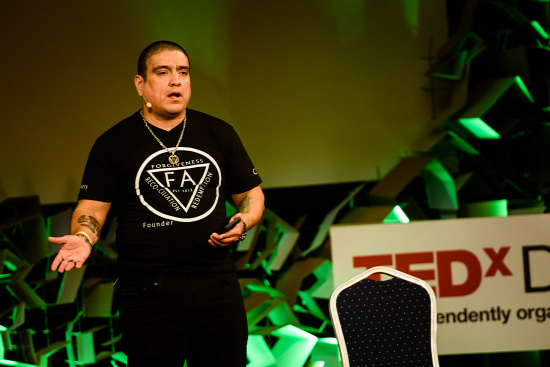"We do not have to be victims of our own stories...but interestingly enough stories are a way out [our suffering]. We hold the power to change our story."
Sammy Rangel ended his ted talk leaving the stage with a standing ovation. He shared some stories of his childhood which was filled with so much abuse and neglect that it's hard not to empathize with story of what lead him to a 7 year prison sentence in solitary confinement.
At the age of 41 he learned that his mother had murdered his brother while he was still in her stomach but it was only the tip of the iceberg of reasons to hate his mother. His father raped him throughout his childhood but what made it worse was that she forced him and his syblings to respect and show love to his abuser as well as deny the existence of the rape. Part of his punishments aside from regular beatings were to starve him or deprive him of toilet visitations- and if he made a mistake his soiled underwear was put in his mouth. The horror continued and he felt helpless and inexistent.

He reached a turning point when he found himself over his mothers bed holding a knife. He was about to kill his mother for all the unnecessary pain. What stopped him was 2 reasons: he still loved his mother and he was afraid; "i was not a born killer" he said. He then ran away and gained- what he thought was- sanctuary in a gang. His mothers response was to convince his siblings that did so because they hated him and It broke his heart so much that he began to believe it wasn't necessary to change their minds. His anger and pain continued to grew that he with the help of his, he took it out on many people and in paticular a homeless man who was left to die after a vicious beating. His eyes swelled as he spoke about the innocent man.
He entered jail during a race riot between the black and white inmates. Being a minority he was naturally placed on the black side. He teared up when he spoke about his best friend who was left to die after he shot during the riot. The prison guards weren't different from his fellow inmates regarding racism so when he begged for medical assistance he felt yet again helpless when this basic need was ignored.
It was during his counseling when he placed himself in his mothers position to answer his many questions when he had a sudden shift in perspective after a lifetime of feeling victimized. He was asked if he had hurt anyone the way his mother had hurt him and he instantly felt guilt. He did take out his anger on innocent people. It was't fair but the only way he could let go of his feelings of victimhood was to forgive.



Utolsó kommentek